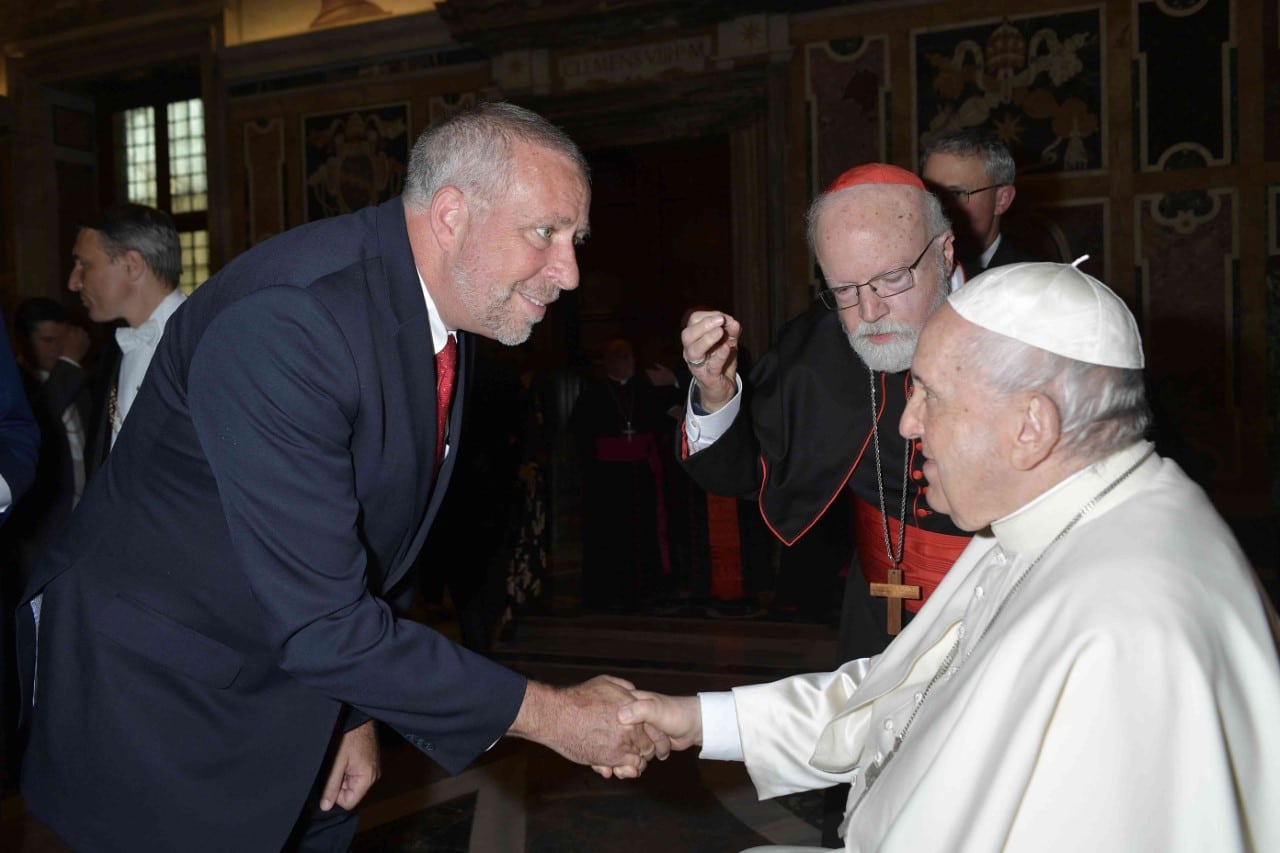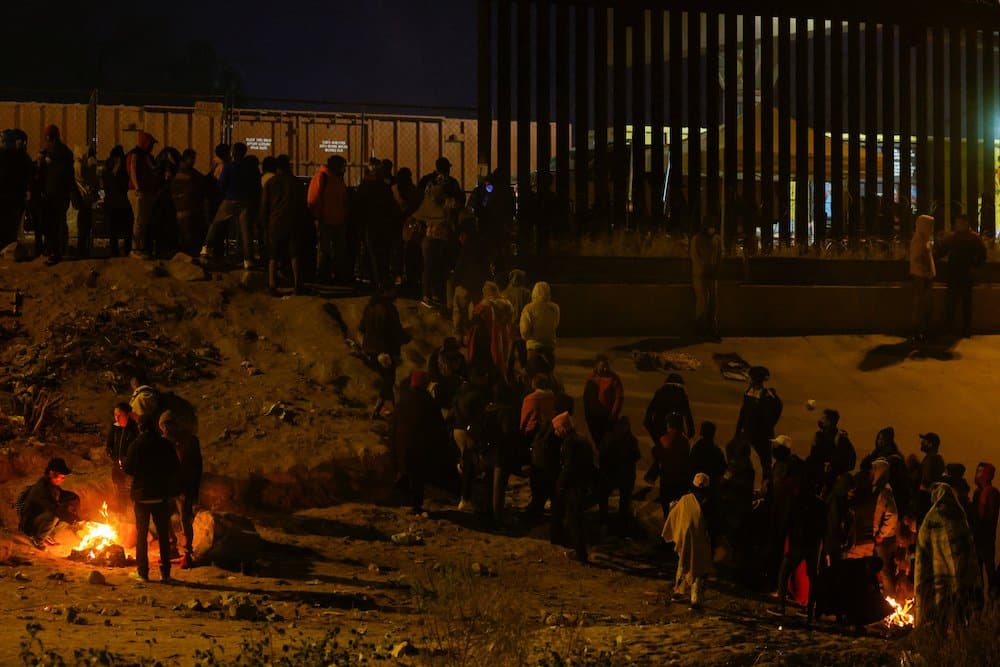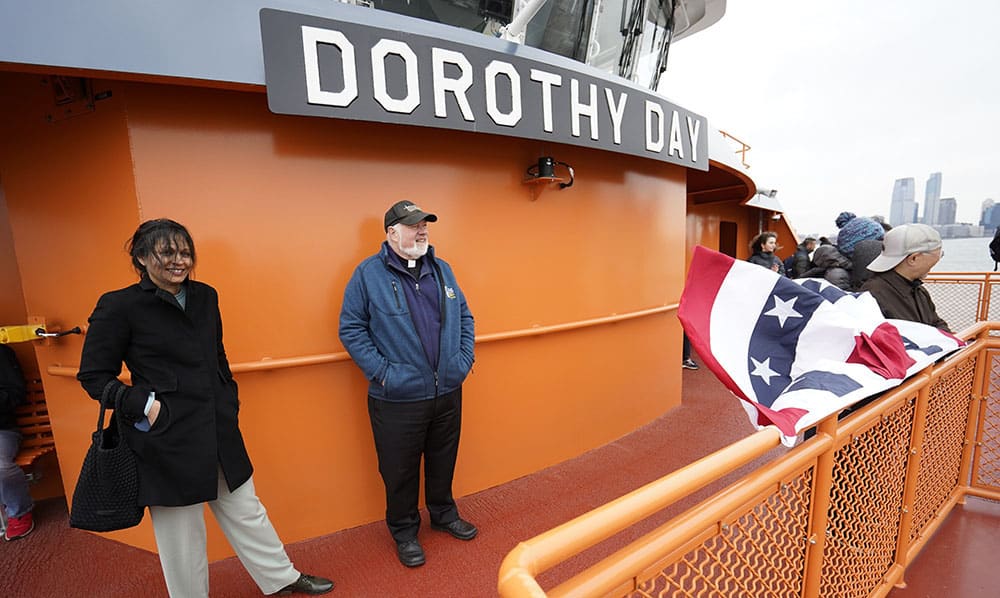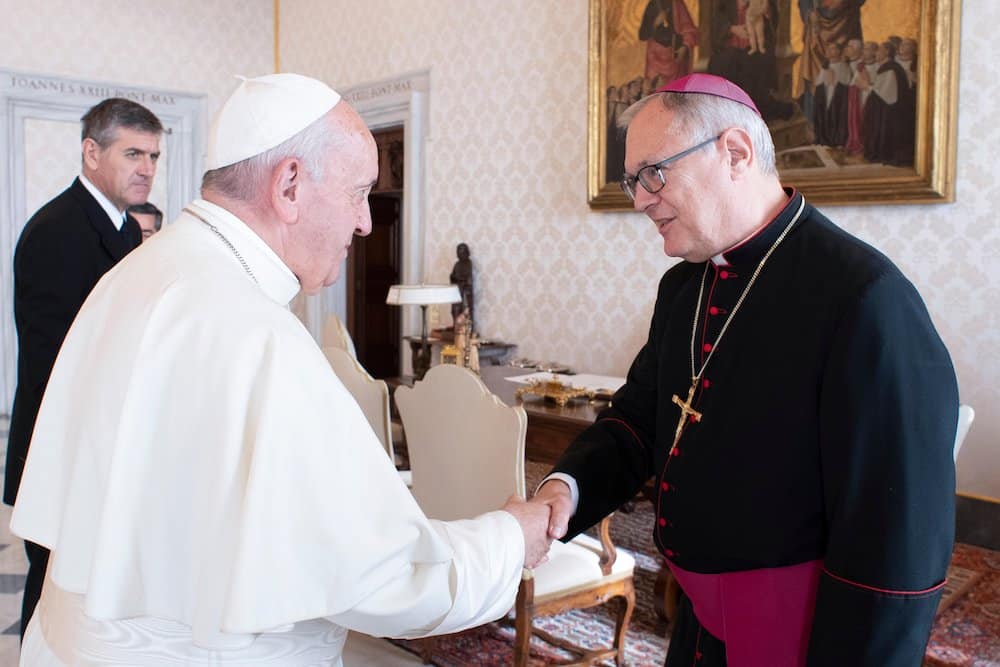Curtis Martin founded the Fellowship of Catholic University Students (FOCUS) 25 years ago, with two missionaries on one campus. Today the movement boasts 850 missionaries serving in 216 locations. More than 4,000 students participate in direct mentorship programs, under the tutelage of those missionaries. More than 23,000 students attended the annual SEEK conference this year, and many thousands more benefit from the day in and day out presence of missionaries on campus.
Recognizing Martin’s efforts and the extraordinary success of FOCUS, Pope Francis recently named Martin as one of 15 consultants to the Dicastery for Evangelization. Martin sat down with Our Sunday Visitor to discuss that appointment, the challenges of evangelizing young people today, what FOCUS can offer parishes and the Eucharistic Revival.
Our Sunday Visitor: What will be the work of the new consultory council for the Dicastery for Evangelization?
Curtis Martin: I was honored to serve first Pope Benedict and Pope Francis through the Council for the Promotion of the New Evangelization. What I love about the Dicastery for Evangelization is that, as it is now situated, it broadens and deepens the vision of the previous council. I would consider myself a student of evangelization, so beyond the great honor of being able to serve the Holy Father and leaders in Rome that are working with him, I have the opportunity to learn from those leaders and to learn from the other experts that are drawn together. There’s many things going on, but at its heart, it’s a gathering of people who are seeking best practices and who are finding where the Holy Spirit is providing the most fruit. To get to know these people, to learn from them, is such a blessing personally, but it also brings rich fruits back into my work at FOCUS.
Our Sunday Visitor: How do you think a role like this impacts the life of the Church at large?
Martin: Catholics in the United States are going through a tremendous development of their understanding of evangelization, I think for many Catholics, the idea of mission has been reduced to only the corporal works of mercy. These works are essential; Archbishop Chaput said a number of years ago, if we don’t care for the poor, we’re going to go to hell. But to be able to highlight that in addition to the corporal works of mercy, the spiritual works of mercy are actually critically important. If you feed somebody, they’re gonna be hungry tomorrow. If you can bring them the Gospel, they can live forever.
Evangelization means different things in different places. I’ve learned that in parts of Asia and Africa, they’ve got people that are coming, but the Church needs resources to care for them. In other parts of the world, if we evangelize effectively, if people come to the Church, others burn our churches down. For me, in the United States, it means awakening people who have fallen into a spiritual coma. Many were raised Christian or Catholic but aren’t practicing. Serving the dicastery has awakened my great desire to do all that we can for everyone to come to know and love Jesus Christ.
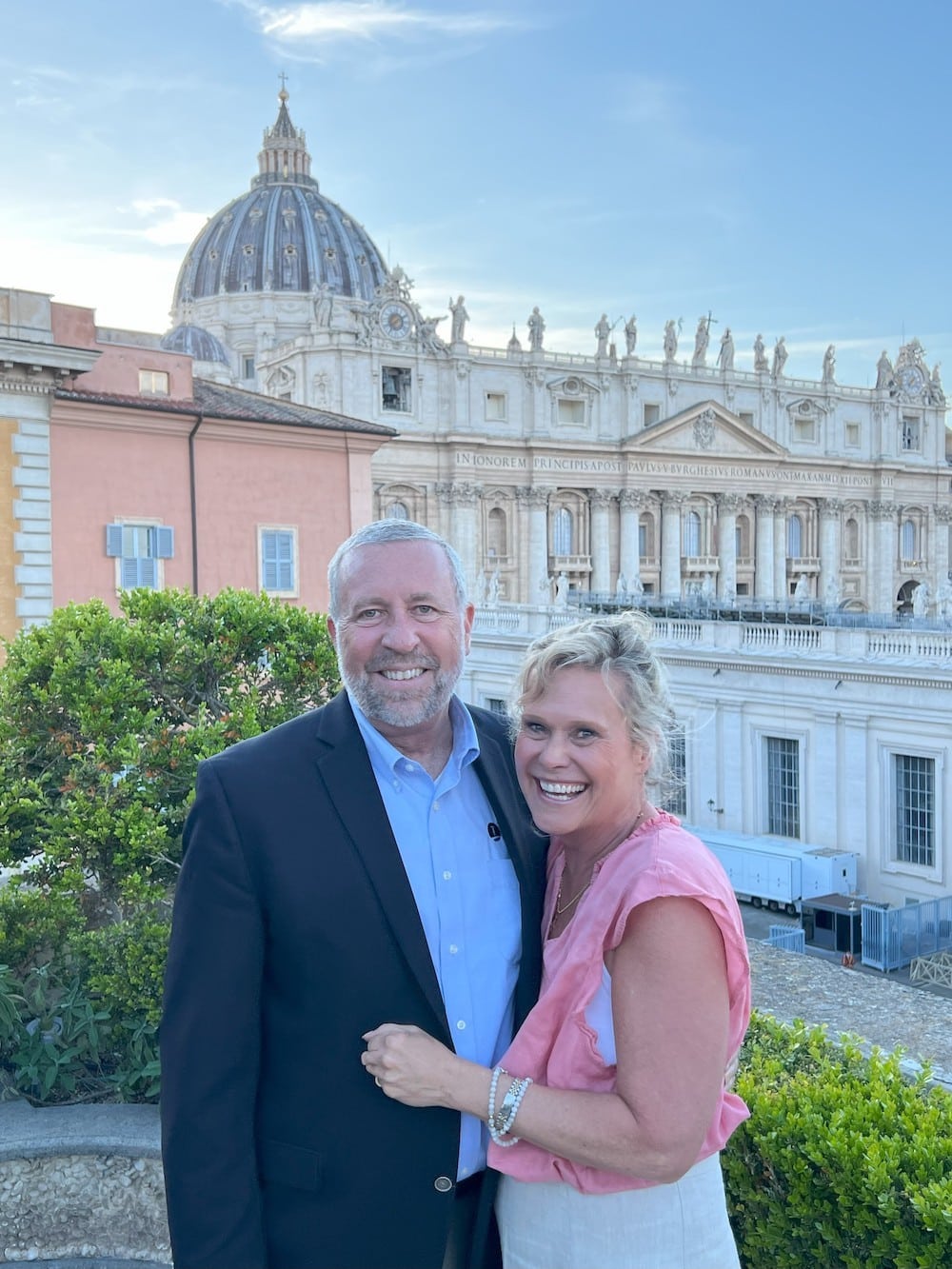
Our Sunday Visitor: You’ve now labored to evangelize college students for 25 years. How have the needs or challenges of evangelization changed? Are students basically the same now or are we facing a new landscape?
Martin: The needs are the same. The circumstances have changed dramatically. The negative impact of the breakdown of the family is so much more real on campus today. The amount of woundedness, the result of a culture running away from Christianity and Judeo-Christian roots is a wounding reality. We have a group of young people today who have been taught “do whatever you want,” because that will make you happy. And they’ve done whatever they wanted with great enthusiasm. And they’re miserable, because the secret to being happy is not doing whatever you want, it’s doing what you ought.
The beautiful thing is, though, in the midst of this breakdown, I would argue that students are hungrier now for the Gospel than they were 25 years ago. Yes, they’re more broken. But that brokenness actually has a silver lining. If you think you have everything you need, you’re not that hungry; when you know you don’t have what you need, you are ready for a change. And so we are still leading with prayer and then with friendship and then the truths and beauties of the Catholic faith. And we’ve never had more students involved in our program than we do today. We’re going to have record-breaking hiring this year! So the response is that this amazing generation is different than students were 25 years ago, but also the same because everyone wants to be loved.
Our Sunday Visitor: Older generations might feel today’s college students are less resilient than their own generation. I’m thinking of labels like “snowflakes” here. Do you find that to be the case?
Martin: I actually think in some ways they’re more resilient, but they’re more wounded. They’ve already endured unbelievable hardships, so many of them have not lived in an intact family growing up; so many of them have lived isolated living in their own bedroom with their own entertainment system, alone. And their friends are digital and not real in the sense that they’re sharing life with them. They’re popular, but they don’t know that they’re loved. And so they’ve endured tremendous wounding. So I don’t think the issue is whether they’re more or less resilient. I would say they are more wounded.
25 years ago, our missionaries walked into the campus dining hall and they could sit down at the table as if they knew the people there … even though they didn’t. They’d start a conversation. But today when you sit in the dining hall, the students there are not dining together. They all have earbuds in and are someplace else. And so the distance to open relationships is further, but the hunger to have relationships is greater.
Our Sunday Visitor: What are the differences that FOCUS has seen on campus ministering in Catholic versus secular contexts? Is it easier to be a missionary at a Catholic university or a big state school?
Martin: I would say there’s a dramatic distinction, but there’s actually three groups. There are those Catholic colleges that are striving to live their Catholic identity. And then there are secular universities. And then there are those Catholic colleges that are not striving to live their Catholic identity, and I would argue they are the most difficult. Whether you have a Catholic college that is striving to live Catholic identity or you’re in a secular environment, you get a new incentive to strive to present the Faith vibrantly. The support is amazing. It’s astounding. In fact, I would argue there’s never been a better time in the history of the world to come to know and to love the Catholic faith.
And right now we’ve got great teachers. They deliver the Faith through chart-topping podcasts and best selling books. Compare that to the Middle Ages where nobody could read and the universities were just being invented! But in the Catholic colleges that refuse to embrace their Catholic identity, there you actually have a caustic situation. Often in such places, people who actually know the Faith relatively well and with an informed decision reject the Faith. That’s a tough one. When people don’t know the Faith well, you can teach it to them, but they lean in when they think they’ve already been taught it and have rejected it. That’s a very difficult situation. C.S. Lewis said, it’s the difference between trying to win the heart of a young woman or win back the heart of a wife who’s left you. You cannot see the sun at night. But you can see the moon and the stars. College campuses and post Catholic Christian cultures are our spiritual nights. But that means light will shine, light always goes further at night.
Our Sunday Visitor: Since FOCUS was founded, Catholic university ministry has been radically transformed. FOCUS has inspired many organizations and dioceses to revitalize their efforts to reach out to young people. What has FOCUS learned that can help renew young adult and parish evangelization?
Martin: We’re actually in the midst of a very successful beta. Right now we have full time missionaries in more than 20 parishes in a beta test. In that test, we have seen hundreds and hundreds of people — over 500 people already involved in just one year in the parishes where we serve with full time parish missionaries. We’ve seen explosive growth! The lived experience of Catholics is their parishes. And if the parishes are healthy, the Church is healthy. And so we are watching an unbelievable renewal.
Who is in parishes? Already we’ve sent 55,000 FOCUS alumni. There are more than 500 parishes that have hired former FOCUS people (student leaders or staff). They don’t work for us, they work for parishes. Well over 50% of U.S. dioceses have a former FOCUS missionary or staff member working for them. What’s happening is we’re moving from despair to hope, from maintenance to mission. Before we started at parishes, the statement was: it just can’t be done. Well, it’s actually happening over and over and over again. It can be done. The question is, do you want to do what it takes to make it happen? And so we’re thrilled about this. And while we still have another year or two of the beta to confirm our efforts, I assume that there will be FOCUS missionaries entering parishes as full-time missionaries by the hundreds within the next 10 years.
Our Sunday Visitor: Our bishops have called for the revival of our parishes by leading us first to the Eucharist. What do you make of the Eucharistic Revival?
Martin: Our experience is that more than any place else in any other circumstance in life, the place that a person is going to encounter Christ, in a life transforming way, will be in front of the Blessed Sacrament. Yes, you can encounter Our Lord in nature. Yes, in Scripture. Yes, in the poor. All of those things are valid and real, and we ought to do all of them. But our experience after 25 years is that more young people have encountered Jesus in a life-changing way in front of the Blessed Sacrament.
So we’re thrilled that the bishops, in a really unanimous position, have said we want this to be a key, and we’re going to invest years into this. First of all, I encourage everybody who is able to consider joining in person for the Eucharistic Congress in Indianapolis. We’ll have hundreds of FOCUS missionaries there; I’ll be there. There will be thousands of FOCUS students there. We are very, very enthused about this. My only proviso — that you won’t hear other places — is that’s a moment in a journey. You don’t need to wait until Indianapolis to start visiting the Eucharist. And you shouldn’t. Start now. Maybe once a week you drive by and stop by your local church … maybe more than once a week!
Father Patrick Briscoe, OP, is editor of Our Sunday Visitor. Follow him on Twitter @PatrickMaryOP

